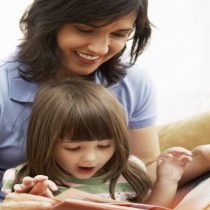
Parenting today has important challenges, including new technologies such as social networks, long working hours and high academic demands, among other factors. But to that has been added the pandemic that has led to prolonged confinements and little socialization, affecting the mental health of both adults and children and adolescents (NNA).
Empirical research on parenting skills has shown that effective parenting practices and a stimulating environment within the family are an outstanding protective factor in the lives of sons and daughters.
In contrast, a parenting with negligent and punitive aspects is related to possible problematic behaviors in children and adolescents, both emotionally and behaviorally.
In addition, it increases the risk that as expectant parents they will continue to repeat patterns of negative family relationships, which can lead to mistreatment, neglect or abuse with their offspring.
This is why the theory of learning social interaction on which the Generation PMTO Program (Parenthood that Motivates with Tenderness and Optimism) is based specifies that parental skills are the key to mediating and cushioning the risk factors associated with the family context.
What is the Generation PMTO Program?
The main focus of the PMTO program is to promote – through training in positive parental skills in parents and caregivers – a positive development in children and adolescents, including the different areas in which they develop: family, peers, school and others.
The stimulation of positive skills in NNA favors emotional regulation, proper management of boundaries and discipline, which decreases the likelihood of behavioral problems and increases positive development, among other factors.
This has shown great effects on future behavior, since skills are installed in the family: it is the same family that becomes an agent of change for its children.
According to the clinical psychologist and coordinator of the PMTO Program of Fundación San Carlos, Luz Cantizano Rioseco, parents can support, for example, the educational processes for their children.
“The first thing is to focus on their strengths and explicitly telling them what they are doing well with phrases like: ‘How good that task was for you!’, ‘I saw that you put a lot of effort into this’, ‘How good that you kept your attention attentive throughout the class’ or ‘You are very intelligent!’”, explains the expert.
This type of phrases “will help children increase their self-esteem and perception of self-efficacy, that they feel capable and want to continue repeating those good deeds for which adults are congratulating them and will favor the educational process”.
The results of working and training families in positive parenting skills are presented at different levels, both in caregivers and in children and adolescents.
Among the results in mothers, fathers and caregivers highlight that they have been trained in this leads to an increase in positive parental practices, improvement in the standard and quality of life, marital satisfaction, decrease in depressive symptoms, decrease in coercive parenthood and decrease in the rate of arrests and long-term poverty.
On the other hand, among the results in children and adolescents, there is an improvement in academic results, increased social skills, a decrease in depressive and/or anxious symptoms, substance abuse, disobedience, criminal behaviors, association with antisocial peers (“bad influence”), decrease in arrest rates or severity of crime, and decrease in abandonment of the home.
Team of the first generation of PMTO facilitators, supervisors and coaches in Chile.
The impact of the pandemic on education
The coordinator of the PMTO Program of Fundación San Carlos recognizes the challenges that online education has involved as a result of the health crisis.
That is why he recommends as a strategy “to adapt the study space within the possibilities of each home. We do not need large spaces, but we do need to adjust them so that children have a learning space that favors their attention and concentration, “says Luz Cantizano.
For example, it suggests turning off the television when studying, leaving cell phones away, reducing distracting elements and having good lighting in place.
It should also be considered “that adults show interest in the educational processes of children. Even when we don’t know or handle the matter that children are working in classes we can accompany them, help them and interest us in what they are learning, they can also tell us”.
Another factor that influences is boredom or loss of interest in online classes. The clinical psychologist points out that the boredom that children manifest should be “normalized and empathized. For children it is important that as adults we understand that being so long in front of screens – when it comes to classes – is fome and boring, in addition to being cerebrally exhausting”.
A second strategy has to do with the monitoring and accompaniment of school activities. “It is not necessary that we are all the time at their side, but it is necessary to look for a moment in the day for children to tell us what they worked in classes and if they left them any homework”, explains Cantizano.
The idea is that if “children feel heard about the emotions associated with the virtual educational process, it will channel that they have a space with adults, attenuating the manifestation of negative emotions during classes”.
Another important strategy is to use a reward system with children, looking for no-cost incentives to help motivate them. “It helps everyone, including adults, to have a goal, something that motivates us to stay on track in everything we do. When something demotivating us or we lose interest, incentives for adults and children are critical because they encourage us to continue, they teach us to be persevering. The invitation is to think about what low-cost incentives would be interesting for your son or daughter?”, highlights the expert.
Incentives can be to choose dinner or eleven that day, spend time with your mother/father, cook something together, watch a movie together, among others. “In short, offer something that is valuable for children and possible for parents to deliver every day. It is the same families who know their sons and daughters best and can choose the best incentives for them, to keep them motivated. Beware here: we do not seek ‘buy’ to children, we want to teach them that when you make good decisions the consequences are positive”, says Cantizano.
It is important to focus on the strengths of children and show them that there is confidence that they will respond positively to what is being asked of them. That is why it is important – as far as possible – to avoid recriminating and recriminating, since “these options only lead us to an escalation of answers and discussions, which could divert us from the situation we want to resolve”.
The importance of socialization
The pandemic has affected everyone’s lives, changing daily routines, social and family dynamics, altering physical spaces and even mental health.
Childhood has also seen how classes have changed, in addition to the lack of meeting spaces with friends, friends and peers. “The spaces of socialization throughout the different stages are very relevant for their positive development. Without a doubt, the pandemic imposes multiple challenges and this is another one of them”, says Luz Cantizano
“Nothing is going to replace the spaces for meeting friends as we lived before all this began, however, there are ways to favor those relationships even in the context of pandemic”, he adds.
The expert thus recommends that families can encourage and facilitate video calls with friends, as well as adults maintain contact with other parents to make that contact more fluid, according to family reality.
Another strategy is active communication, from adults to children, which involves talking about their friends, asking them questions gradually that do not turn into interrogations), such as who are best friends, how much she misses them and how she feels without seeing them, what she would like to do with him or her.
The important thing is to show empathy and understanding, in addition to putting yourself in the place of children, and avoid phrases like “this is going to happen don’t worry” and add phrases like “I understand you”, “I would also feel like you”. Sometimes children just need us to listen to them and understand them, not give advice they haven’t asked for or impose our thinking.
translated from Spanish: Strengthening parental skills to support learning in children and adolescents
July 22, 2021 |





